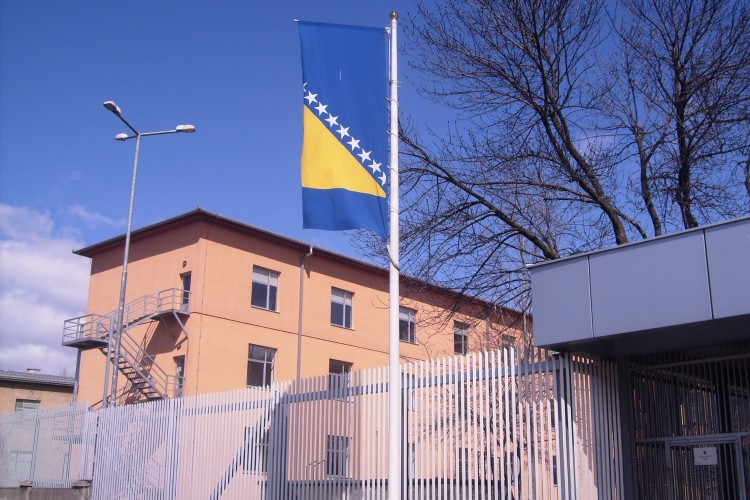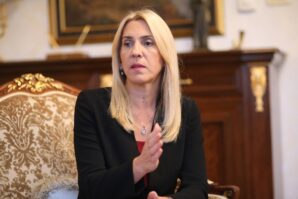 Mrs. Sanja Kulenovic is the author of “The Siege of Sarajevo” book, a story on separation, struggle and strength. Together with her husband, back in 1992, they were celebrating the honeymoon in Pasadena, California, when they turned on CNN to discover that their hometown, Sarajevo, is being devastated by bombing.
Mrs. Sanja Kulenovic is the author of “The Siege of Sarajevo” book, a story on separation, struggle and strength. Together with her husband, back in 1992, they were celebrating the honeymoon in Pasadena, California, when they turned on CNN to discover that their hometown, Sarajevo, is being devastated by bombing.
“It started as a project for my children, about 10 years ago. I wanted to translate letters I had received from my parents and other relatives and friends during the siege. I wanted my daughters to learn what had happened in Sarajevo. As I read bits and pieces of the letters to them, they started asking more and more questions, and I wrote more—until letters became only one part of the story. The other is my own story of immigrant life in America,” Mrs. Kulenovic starts her interview with Sarajevo Times.
Letters from her family in Sarajevo provide heart-wrenching first-hand accounts of the devastation of the siege and also of Sarajevans’ resilience.
“As you pointed out, the letters are also a testament to people’s resilience and something unique to Sarajevans — their ability to not let the soul of their city die, even when their lives were reduced to bare survival and when they were isolated from the rest of the world,” Mrs. Kulenovic explains.
“Letters are my favorite part of the book — not only because I immortalized my parents though them, but also because these letters are a very authentic and unique way to portray life in Sarajevo during the siege: what people ate, how they cooked, what it felt like when a bomb slammed into the building people were in, how they got up in the morning when icicles formed inside the house … and countless other experiences,” Mrs. Kulenovic explains.
Sarajevo Times: You started your new life in California in 1992, can you explain how you managed to “survive” there, considering you had nothing at that time, no family there, no job?
“At the time, I viewed our situation as quite desperate. We had to take on jobs like gardening and cleaning houses to feed ourselves, and we had to watch every cent we spent. We were facing an uncertain future in a foreign country and had to build our lives from zero — actually, as one of our friends said, we had to “climb a mountain to get to zero.” But when I returned to Sarajevo in 1996 and learned and witnessed consequences of what people had to go through during the siege, I was almost ashamed to tell my stories of “survival.”

The first year of her life in California now seems like a blur. After the initial shock of learning of the beginning of the siege, she became terrified as to what was happening in Sarajevo. They didn’t have communication with their families for months — didn’t know if they were alive or dead. At the same time, she was beyond worried about us here. We did not have valid passports, visas, work permits … basically, they were stateless.
“It was extremely difficult to overcome a feeling that we literally could not go back, that we had no other option but stay here. Also, even though we watched the war on the news every night, each time it was as if we were watching it for the first time. That is how unimaginable it was for us to accept what was going on in Sarajevo,” Mrs. Kulenovic adds.
Sarajevo Times: Your story personalizes what it is really like to be an immigrant, starting over with nothing, at a time when immigrants and refugees worldwide were being vilified and reduced to a political talking point. How it felt to be refugee at that time? How people reacted when you said you are Bosnian?
 For me, just to say “I am a refugee” was almost unimaginable. It meant you didn’t belong anywhere, you had no home, no country. And we, as Yugoslavs, had always been proud of our country, loved it. As Sarajevans, we had lived in peace and harmony for centuries. So, for us to, all of a sudden, not have that feeling of belonging was very difficult.
For me, just to say “I am a refugee” was almost unimaginable. It meant you didn’t belong anywhere, you had no home, no country. And we, as Yugoslavs, had always been proud of our country, loved it. As Sarajevans, we had lived in peace and harmony for centuries. So, for us to, all of a sudden, not have that feeling of belonging was very difficult.
Almost each time someone asked me “Where are you from?” and I replied, “from Bosnia,” the next thing I heard would be, “I am so glad you are here. I am sorry to hear what is happening in Sarajevo and Bosnia.” People were extremely sympathetic to us, friendly and accepting. Living in Los Angeles for more than 25 years now, I have never encountered a situation where I was viewed as a “second-class citizen” because I am an immigrant.
“I truly think these letters are a very valuable historical document and that new generations of Bosnians, especially those born and raised to immigrants all over the world, should read them as a history lesson,” Mrs. Kulenovic concluded.
Interview by Zejna Yesilyurt

















